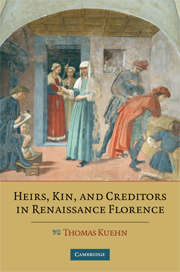Book contents
- Frontmatter
- Contents
- List of Tables
- Preface: The Ambivalence of Inheritance
- Introduction: Of Inheritance and Kinship
- 1 Family and Inheritance
- 2 Florentine Laws Regulating Inheritance and Repudiation
- 3 Repudiation and Inheritance
- 4 Profile of Florentine Repudiation and Inheritance
- 5 Repudiations and Household Wealth
- 6 Repudiation as an Inheritance Practice
- 7 Repudiations in Dispute
- Conclusion
- Appendix 1
- Appendix 2
- Appendix 3
- Appendix 4
- Appendix 5
- Appendix 6
- Sources and Abbreviations
- Index
1 - Family and Inheritance
Published online by Cambridge University Press: 17 August 2009
- Frontmatter
- Contents
- List of Tables
- Preface: The Ambivalence of Inheritance
- Introduction: Of Inheritance and Kinship
- 1 Family and Inheritance
- 2 Florentine Laws Regulating Inheritance and Repudiation
- 3 Repudiation and Inheritance
- 4 Profile of Florentine Repudiation and Inheritance
- 5 Repudiations and Household Wealth
- 6 Repudiation as an Inheritance Practice
- 7 Repudiations in Dispute
- Conclusion
- Appendix 1
- Appendix 2
- Appendix 3
- Appendix 4
- Appendix 5
- Appendix 6
- Sources and Abbreviations
- Index
Summary
A well-known metaphoric statement of the great Trecento jurist, Bartolo da Sassoferrato (1313–1357), was that “familia accipitur in iure pro substantia” (family is taken in law as its substance). It was in the midst of commenting on the civil law jurisprudence regarding children and their rights to inherit that Bartolo offered his definition of familia. His definition was in part intent on setting family into a basis larger than that of natural generation, relationships, and reputation.
It is, in fact, a somewhat enigmatic and ambiguous statement. Substantia is not otherwise much encountered in the writings of medieval glossators and commentators of civil law, nor in their chief source, the Corpus iuris civilis. Yet Bartolo chose it in preference to other possibilities – possessiones, res (immobiles or mobiles), bona, proprietates, even honor. A nebulous term like substantia, in fact, potentially subsumed all of these.
In the next generation, Angelo degli Ubaldi (1323–1400), working out the legal issues in a Florentine inheritance case, elaborated that
the substance of moveable and immoveable goods [real property] of the world's fabric is visible and corporeal, and consequently palpable. But the substance of rights and actions is incorporeal and invisible.
Interestingly, he went on to observe that the “palpable” substantia of goods could be lost (by legal processes such as usucapio or prescription), whereas the invisible substance of rights and actions could not be lost because “they are infixed in our bones” (“infixa sunt ossibus nostris”).
- Type
- Chapter
- Information
- Heirs, Kin, and Creditors in Renaissance Florence , pp. 20 - 50Publisher: Cambridge University PressPrint publication year: 2008



